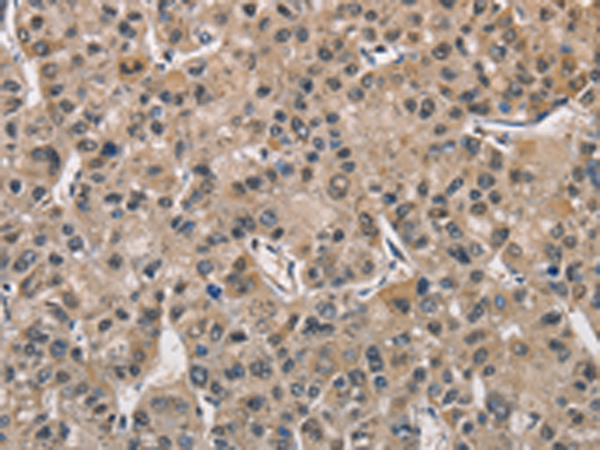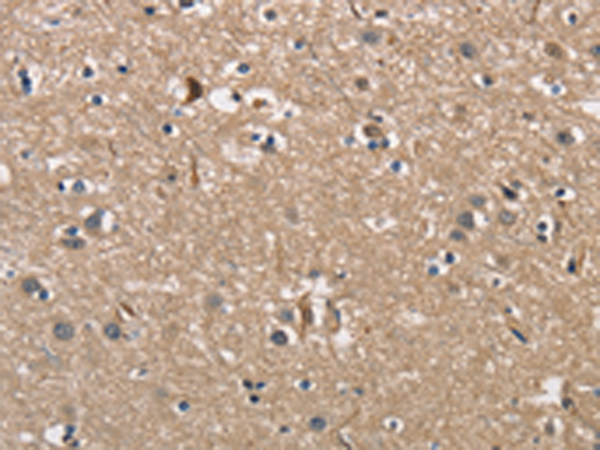


| WB | 咨询技术 | Human,Mouse,Rat |
| IF | 咨询技术 | Human,Mouse,Rat |
| IHC | 1/50-1/200 | Human,Mouse,Rat |
| ICC | 技术咨询 | Human,Mouse,Rat |
| FCM | 咨询技术 | Human,Mouse,Rat |
| Elisa | 1/2000-1/10000 | Human,Mouse,Rat |
| Aliases | PGKA; MIG10 |
| WB Predicted band size | 45 kDa |
| Host/Isotype | Rabbit IgG |
| Antibody Type | Primary antibody |
| Storage | Store at 4°C short term. Aliquot and store at -20°C long term. Avoid freeze/thaw cycles. |
| Species Reactivity | Human, Mouse, Rat |
| Immunogen | Fusion protein of human PGK1 |
| Formulation | Purified antibody in PBS with 0.05% sodium azide and 50% glycerol. |
+ +
以下是关于PGK1抗体的3篇参考文献及其摘要的简要概括:
---
1. **文献名称**:*PGK1 as a Therapeutic Target in Cancer: Role of a Specific Antibody in Inhibiting Tumor Growth*
**作者**:Zhang Y, et al.
**摘要**:该研究探讨了PGK1在多种癌细胞系中的高表达,并开发了一种特异性PGK1抗体用于靶向治疗。通过体外和体内实验,证明该抗体能够抑制PGK1的酶活性,从而减少肿瘤细胞的糖酵解和增殖能力,为癌症治疗提供了新策略。
---
2. **文献名称**:*Immunohistochemical Analysis of PGK1 Expression in Colorectal Cancer Prognosis*
**作者**:Li X, et al.
**摘要**:研究利用PGK1抗体对结直肠癌组织进行免疫组化分析,发现PGK1的高表达与患者生存率低及肿瘤转移相关。结果表明,PGK1可作为预后标志物,其抗体在临床诊断中具有潜在应用价值。
---
3. **文献名称**:*PGK1 Localization in Alzheimer’s Disease Brains: Insights from Antibody-Based Imaging*
**作者**:Smith JL, et al.
**摘要**:通过PGK1抗体进行免疫荧光和Western blot分析,研究发现阿尔茨海默病患者脑组织中PGK1的亚细胞定位异常,可能与线粒体功能障碍相关。该抗体为神经退行性疾病中代谢异常的研究提供了工具。
---
以上文献展示了PGK1抗体在癌症机制研究、临床诊断及神经疾病中的多样化应用。
The phosphoglycerate kinase 1 (PGK1) antibody is a key tool for studying the functional roles of PGK1. a ubiquitously expressed metabolic enzyme critical in glycolysis. PGK1 catalyzes the conversion of 1.3-bisphosphoglycerate to 3-phosphoglycerate, generating ATP during glucose metabolism. Beyond its metabolic function, PGK1 is implicated in diverse cellular processes, including DNA repair, autophagy, and apoptosis, and has been linked to cancer progression, neurodegenerative diseases, and viral infections. Its overexpression in tumors is associated with enhanced glycolysis (the Warburg effect), metastasis, and chemoresistance, making it a potential therapeutic target.
PGK1 antibodies are widely used in research to detect protein expression levels, localization, and post-translational modifications. They enable techniques like Western blotting, immunohistochemistry (IHC), immunofluorescence (IF), and flow cytometry, aiding in the exploration of PGK1's roles in disease mechanisms. Commercially available PGK1 antibodies are typically raised in hosts such as rabbits or mice, targeting specific epitopes of human PGK1. Validation for specificity and cross-reactivity is essential, as isoforms or homologous proteins may cause false signals. Recent studies also highlight PGK1's non-canonical roles, such as acting as a protein kinase in hypoxia signaling, underscoring the antibody's utility in cutting-edge research. Its applications extend to biomarker discovery and evaluating therapeutic interventions targeting metabolic pathways.
×